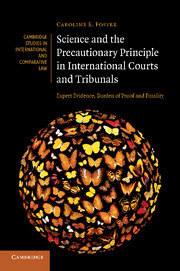 Science and the Precautionary Principle in International Courts and Tribunals
Science and the Precautionary Principle in International Courts and Tribunals 9 - Conclusion
Published online by Cambridge University Press: 11 April 2011
Summary
Scientific disputes pose new challenges within the rationalist conception of adjudication in the international setting. Important factual elements of such disputes are acknowledged as unknowable, and so it becomes difficult to maintain a strict traditional rationalist conception of adjudication as a process where the law is applied to the facts. As a result, scientific disputes are generating renewed attention to rules about evidence and proof in international courts and tribunals.
The scientific disputes discussed in this book are ‘live’ policy cases where complainants want respondents to change their conduct. These cases differ from other disputes where complainants are seeking only compensation or the restoration of their dignity. At the national level it has been suggested that policy disputes call for a modification to traditional adversarial procedure. This is precisely what is taking place in international courts and tribunals, as they increasingly experiment with a wide range of methods for investigating central aspects of these scientific disputes.
Among the results of this experimentation is a greater reliance on expert evidence. Here, complex problems begin to arise. Many of the legal rules that are applicable will have been crafted with scientific uncertainty in mind. They may incorporate tests according to which a state is required to conduct itself as ‘necessary’ in the circumstances, or take steps based on ‘sufficient’ scientific evidence, for example. International courts and tribunals will need the close assistance of experts to interpret and apply these tests in different contexts.
- Type
- Chapter
- Information
- Science and the Precautionary Principle in International Courts and TribunalsExpert Evidence, Burden of Proof and Finality, pp. 341 - 348Publisher: Cambridge University PressPrint publication year: 2011
